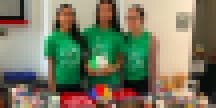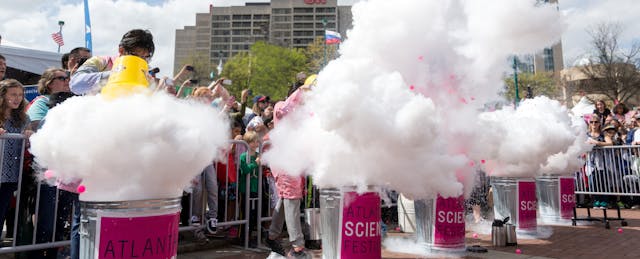Students and parents, eager to embark on one of the 100 events held by the Atlanta Science Festival, bustled through the revolving doors of Georgia State University’s (GSU) Petit Science Center in Downtown Atlanta.
Since 2014, the Atlanta Science Festival has drawn more than 150,000 people from across the city. The exhibition spans two weeks and brings a variety of activities that celebrate science and technology, including a Family Science Carnival where parents and kids play games, to The Story Collider, where people tell personal stories about their experiences with science.

GSU, one of the many participating partners of the festival, hosted a free event called “Discovery Day: Discovery Stations” where multiple floors of their science building featured hands-on demonstrations led by university students.
“It brings awareness and a sense of excitement about science. You get all the hands-on activities, and the kids get to interact with students and the professors here,” says Nayaab Babar, a fifth-year biology major from Georgia State University, who is volunteering her time to man one of the stations. “They get to see the cool side of science, and we can encourage them to go into STEM [science, technology, engineering and math].”

Babar explained how students participating in GSU activities are given a card once they enter the building. As they visit different stations, they receive a sticker once an exercise is completed. When students are done collecting stickers, they get to choose from a range of prizes that are science-themed objects, like t-shirts and pencils.
A few floors up, where kids are interacting with various booths, Dorothy Mourtada, a mom who homeschools her 8- and 11-year-old children, shared why she came to the event. “This is our second year of coming to the Atlanta Science Festival, and it’s very informative, it’s hands-on. That’s what I like about it. It sparks the interest of the kids to get them into science and math. It’s a lot of STEM and STEAM at this particular event.”
As a parent who leads homeschool lessons, Mourtada has been seeking more opportunities to teach her kids applied science and math concepts and notes that the event offers her a chance to expand their learning. Not only does the festival help her supplement her curriculum at home, but it also sheds light on organizations and venues that she wouldn’t have known about otherwise.
“The festival is doing a great thing,” Mourtada points out. “It’s exposing a lot of kids to science whereas some students don’t have the luxury that other schools may have [to do that].”
Exposing children who might not otherwise have the opportunity to experience science is one of Meisa Salaita’s goals. She serves as the co-founder and co-director of the Atlanta Science Festival. Since starting the festival, she has worked with several local partners such as GSU to spread the work throughout the city. She says this helps people understand how science happens in their local community.

“The festival allows for partnerships to grow and the recognition that our city is great,” Salaita explains. “There’s a desire to highlight what is happening in Atlanta so that people know what is happening in their own backyard.”
During our interview, she noted that 70 percent of people attending the festival never visited many of the venues that have partnered with her over the years.
In addition to getting people involved with the local community, Salaita also hopes to help people meet real scientists, something she says most people have not done before. She hopes that by showcasing the diversity of people within the profession, more individuals from the community can see themselves as a part of it.
“One of the pieces we try and change with the festival is this feeling that science is done by old white men who are super smart—and that’s not true,” says Salaita. “Everyone is doing science.”
The two-week festival caps off on March 24th with a party, setting up the kind of celebratory atmosphere around science Salaita hopes other communities can embrace.
“There seems to be this realization that working together on a festival that impacts the city can create something great,” says Salaita, noting that both businesses and educators in local communities can benefit from celebrating learning.


